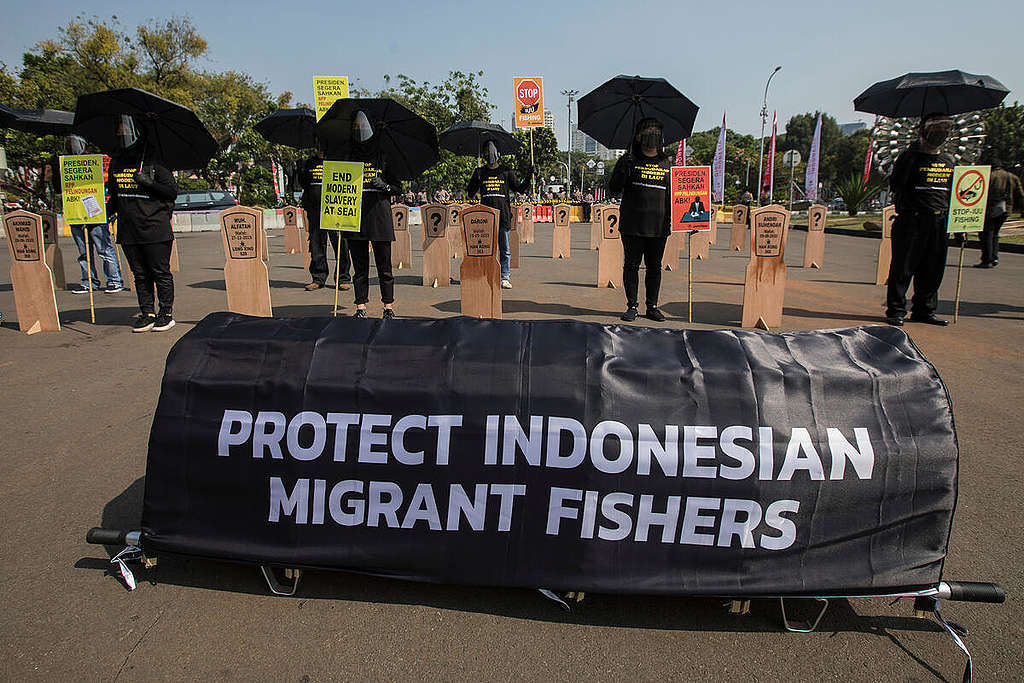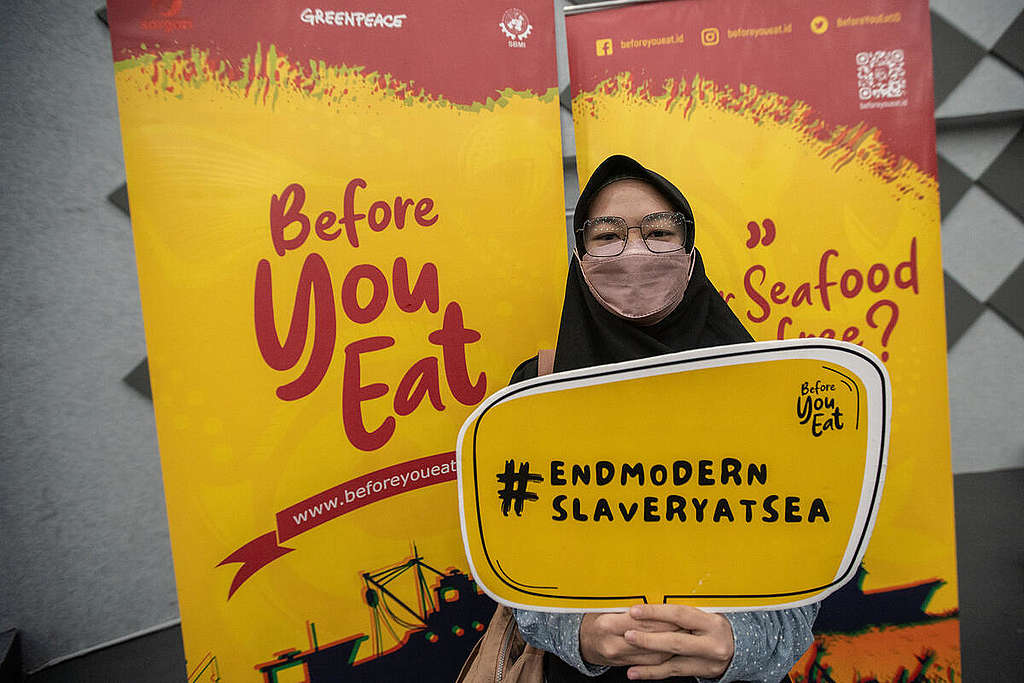Imagine that you are about to climb a mountain. You’ve trained so hard and prepared for months, if not years. This particular climb though is actually a quest– for justice for all workers, particularly the abused and the oppressed. It’s very much what is happening in real life- efforts to protect migrant fishing workers is much like climbing in the Himalayas. Very high. Very tough. Very distant.
These are the thoughts that come to my mind as the world celebrates International Labor Day. This year, I can say the climb no longer feels so lonely. At a certain point after a steep terrain, there is another climber who wants company and aks to continue climbing with us.
“Us” is a group of civil society organizations, including Greenpeace Southeast Asia, working tirelessly and committed to protecting migrant fishers from Southeast Asia, particularly Indonesians. That other “climber” is the Ministry of Foreign Affairs of the Republic of Indonesia (MoFA).

After years of campaigning, the Indonesian MoFA has strengthened its commitment and efforts to accelerate better regulations for protecting migrant fishers – not only for Indonesians, but also fishers from other parts of Southeast Asia working onboard distant water fleets. At the national level, the ministry initiated an inter-ministerial meeting to start the process of adopting an international regulation by the International Labour Organization (ILO). At the regional level, the MoFA brought the issue forward as one of the agenda at this year’s Association of Southeast Asian Nations (ASEAN) Summit.
One level higher
This year, Indonesia holds the chairmanship of ASEAN and will play host to next week’s ASEAN Summit in East Nusa Tenggara. As host and chair, Indonesia has the authority to raise priority issues to gain support from other ASEAN member states. Will migrant fishers’ rights be included? Presumably, yes.
In early February, foreign ministers of the ASEAN member states met and agreed on a number of matters for the upcoming summit. In a press statement from the meeting, one of the points read:
“We reaffirmed our regional commitment to protect migrant workers in the entire migration cycle as enshrined in the ASEAN Consensus on the Protection and Promotion of the Rights of Migrant Workers. We agreed to strengthen the protection of migrant workers through the adoption of an ASEAN Leaders’ declaration regarding the protection of migrant workers in crisis situations and an ASEAN Leaders’ declaration concerning the protection of migrant workers in crisis situations and an ASEAN Leaders’ declaration concerning the protection of migrants working in fishing vessels.”
Based on ASEAN’s statement above, Greenpeace Southeast Asia and its allies expect a strong stand on protecting migrant workers employed in distant water fishing.
For the upcoming ASEAN talks, we propose that the following issues be taken into consideration for the ASEAN Leader’s Declaration:
- The ILO has previously declared work on fishing vessels as one of the most dangerous, even deadly, professions.
- Many countries in Southeast Asia (e.g. Indonesia, the Philippines, and Vietnam) supply crews for foreign fishing vessels.
- From 2014 to 2022, the Indonesian Migrant Workers Union (SBMI) recorded a continuous increase in the number of cases of forced labor against Indonesian migrant fishers. Many of these cases fulfilled the elements of trafficking in persons.
- News about migrant fishers dying while working at sea are frequently being reported, meaning the abuse also keeps occurring.
A step in the right direction
“We have to unite a common vision for [migrant fisher] protection,” said Judha Nugraha, Director of Indonesian Citizen Protection and Indonesian Legal Entity of the Indonesian MoFA.
Such pronouncements bring us hope- like a cool breeze to refresh us.
The ministry recently set an inter-ministerial meeting on April 15 to start the process towards ratifying an international legal instrument- the ILO Convention 188 (C-188). The meeting is a significant one and is an indication that Indonesia is in the right speed and direction for having better mechanisms to protect all fishers, including migrants working on distant water fishing vessels.
By ratifying the C-188, Indonesia will be able to strengthen regulations that will ensure migrant fishers’ safety while working onboard foreign fishing vessels. This will hopefully lead to improvements concerning the well-being of our local fishers. Strictly regulated by the convention are details concerning workers’ recruitment and working hours, including wages, accommodation, facilities, health support, and social security.
Moreover, Indonesian seafood products will benefit from it with better traceability mechanisms in place to ensure there are no elements of forced labor in their supply chains.
What lies ahead?

Like a climb to one of the peaks in the Himalayas, the measures already taken by the Indonesian MoFA can be likened to a hot cup of tea we enjoy at a pit stop to soothe our tired bodies and to give us a buzz to keep going. What’s next?
Again, if this were a climb, we need to make sure that all climbers safely arrive and all accounted for before we continue on to reach the summit. No one gets left behind.
Today, we clearly recognise the Indonesian MoFA as a real and committed climber, co-leading us on this exciting journey. We hope to find other climbers along the way and have other ASEAN leaders and government stakeholders join us until we reach the end of the journey and conquer workers’ justice for all.
Vela Andapita is the Beyond Seafood Digital Communications Coordinator for Greenpeace Southeast Asia
